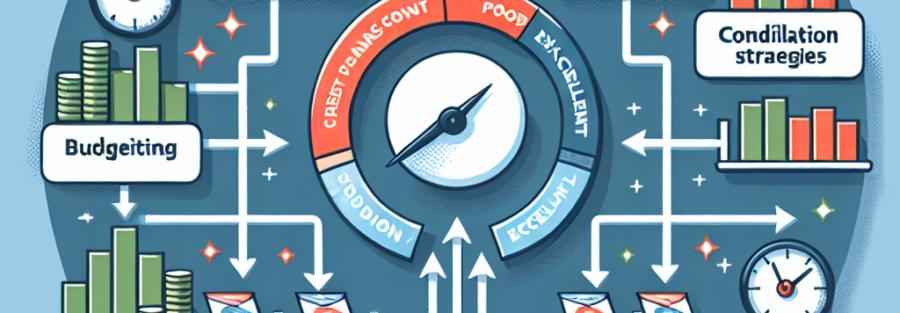Credit scores play a critical role in personal finance, particularly when it comes to managing and reducing debt. They serve as a reflection of an individual’s creditworthiness, influencing the terms of loans, credit card interest rates, and even insurance premiums. Understanding credit scores is essential for anyone looking to implement effective debt reduction strategies. By grasping how these scores work and what factors influence them, individuals can take proactive steps to improve their financial standing, thus enabling them to manage and reduce their debt more effectively.
The Importance of Credit Scores in Debt Management Strategies
A credit score is a numerical representation of a person’s credit history, summarizing their ability to repay borrowed money. Lenders rely on these scores to assess the risk of lending to a borrower. A higher credit score typically results in better loan terms, such as lower interest rates and higher borrowing limits. Consequently, individuals with higher credit scores are often in a more favorable position to negotiate terms when consolidating or refinancing debt, making it essential for anyone serious about debt reduction to prioritize their credit score.
Additionally, credit scores are not just important for obtaining loans; they also impact various aspects of daily life, including renting an apartment or securing a job. Many landlords and employers conduct credit checks to determine reliability and responsibility. Therefore, maintaining a healthy credit score can broaden opportunities beyond just financial transactions, making it a vital aspect of overall life management. Individuals with good credit scores often feel more empowered to take advantage of financial opportunities that can aid in their debt reduction efforts.
Improving your credit score can also have psychological benefits. Knowing that your financial health is in good standing can alleviate stress and anxiety associated with debt. It can motivate individuals to adopt sound financial practices, such as budgeting and saving, further aiding their journey towards debt reduction. Therefore, understanding the importance of credit scores can inspire individuals to take action, fostering a proactive approach to managing their financial health.
Key Factors Influencing Your Credit Score and Debt Reduction
Several key factors determine your credit score, with payment history being the most significant. This element accounts for about 35% of the score, reflecting whether bills and loans have been repaid on time. Late payments, defaults, or bankruptcies can severely damage a credit score and make it more challenging to access low-interest loans, ultimately complicating debt reduction efforts. Consistently making timely payments is crucial; even small, consistent payments on existing debt can positively influence this aspect of the credit score.
Another important factor is the credit utilization ratio, which measures the amount of credit you are using relative to your total available credit. This ratio accounts for around 30% of your credit score. A lower utilization ratio indicates to lenders that you are not overly reliant on credit, which can enhance your credit score. Ideally, keeping your utilization below 30% is advisable, and for those focusing on debt reduction, aiming for a lower ratio can provide a dual benefit: improving credit scores while actively paying down existing debt.
Lastly, the length of your credit history and the mix of credit types also play roles in determining your credit score. A long and healthy credit history can positively impact your score, while having a diverse mix of credit types—such as revolving credit (credit cards) and installment loans (personal loans)—can also demonstrate responsible credit management. Individuals who are aware of these factors can strategically focus their debt reduction efforts not only on paying down existing debts but also on building a healthy credit profile that supports their long-term financial goals.
Understanding credit scores is a fundamental step for anyone looking to implement effective debt reduction strategies. By recognizing the importance of credit scores in financial decision-making and the key factors that influence them, individuals can take informed steps towards managing their debt. These steps include timely payments, maintaining a healthy credit utilization ratio, and understanding the significance of credit history. By prioritizing credit health, individuals can unlock better financial opportunities, paving the way for a more secure and manageable financial future.



